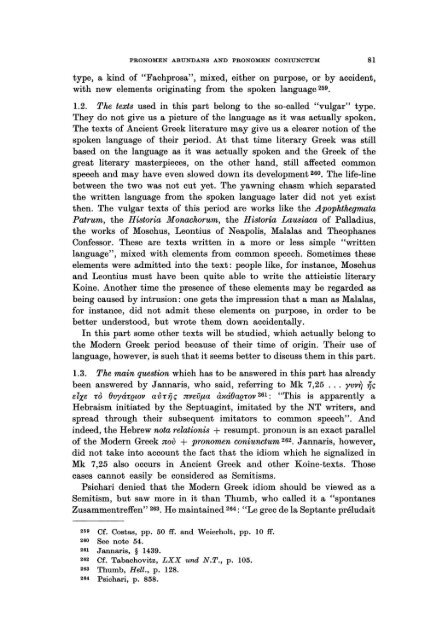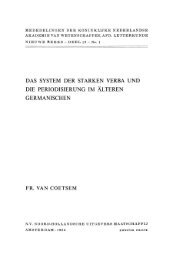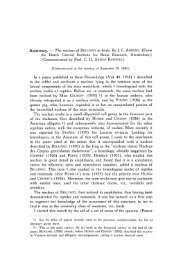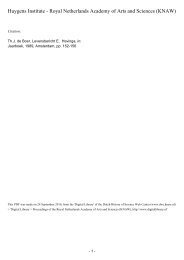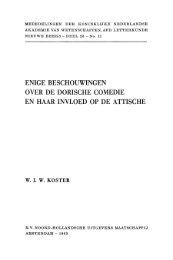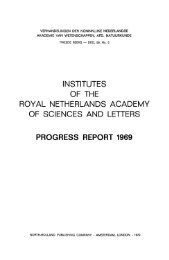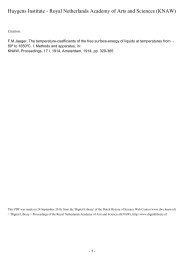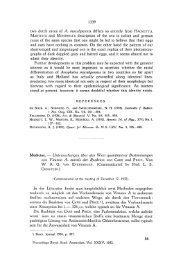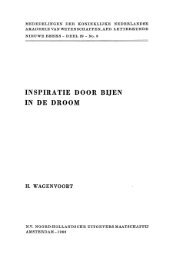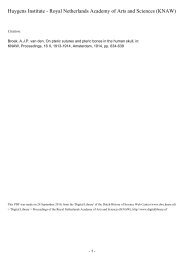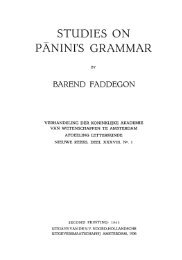Pronomen Abundans and Pronomen Coniunctum. A ... - DWC
Pronomen Abundans and Pronomen Coniunctum. A ... - DWC
Pronomen Abundans and Pronomen Coniunctum. A ... - DWC
Create successful ePaper yourself
Turn your PDF publications into a flip-book with our unique Google optimized e-Paper software.
PRONOMEN ABUNDANS AND PRONOMEN CONIUNCTUM 81<br />
type, a kind of "Fachprosa", mixed, either on purpose, or by accident,<br />
with new elements originating from the spoken language 259.<br />
1.2. The texts used in this part belong to the so-called "vulgar" type.<br />
They do not give us a picture of the language as it was actually spoken.<br />
The texts of Ancient Greek literature may give us a clearer notion of the<br />
spoken language of their period. At that time literary Greek was still<br />
based on the language as it was actually spoken <strong>and</strong> the Greek of the<br />
great literary masterpieces, on the other h<strong>and</strong>, still affected common<br />
speech <strong>and</strong> may have even slo wed down its development 260. The life-line<br />
between the two was not cut yet. The yawning chasm which separated<br />
the written language from the spoken language later did not yet exist<br />
then. The vulgal' texts of this period are works like the Apophthegmata<br />
Patrum, the Historia Monachorum, the Historia Lausiaca of Palladius,<br />
the works of Moschus, Leontius of Neapolis, Malalas <strong>and</strong> Theophanes<br />
Confessol'. These are texts written in a more or less simple "written<br />
language", mixed with elements from common speech. Sometimes these<br />
elements were admitted into the text: people like, for instance, Moschus<br />
<strong>and</strong> Leontius must have been quite ab Ie to write the atticistic literary<br />
Koine. Another time the presence of these elements may be regarded as<br />
being caused by intrusion : one gets the impression that a man as Malalas,<br />
for instance, did not admit these elements on purpose, in order to be<br />
better understood, but wrote them down accidentally.<br />
In this part some other texts will be studied, which actually belong to<br />
the Modern Greek period because of their time of origin. Their use of<br />
language, however, is such that it seems better to discuss them in this part.<br />
1.3. The main question which has to be answered in th is part has already<br />
been answered by Jannaris, who said, referring to Mk 7,25 ... yvv~ ~ç<br />
elXe -rà Ovyá-r(!wv av'l"ijç nvevfla àxáOa(!-rov 261: "This is apparently a<br />
Hebraism initiated by the Septuagint, imitated by the NT writers, <strong>and</strong><br />
spread through their subsequent imitators to common speech". And<br />
indeed, the Hebrew nota relationis + resumpt. pronoun is an exact parallel<br />
of the Modern Greek nov + pronomen coniunctum 262. Jannaris, however,<br />
did not take into account the fact that the idiom which he signalized in<br />
Mk 7,25 also occurs in Ancient Greek <strong>and</strong> other Koine-texts. Those<br />
cases cannot easily be considered as Semitisms.<br />
Psichari denied that the Modern Greek idiom should be viewed as a<br />
Semitism, but saw more in it than Thumb, who called it a "spontanes<br />
Zusammentreffen" 263. He maintained 264: "Le grec de la Sept ante préludait<br />
2:;9 Cf. Costas, pp. 50 ff. <strong>and</strong> Weierholt, pp. 10 ff.<br />
260 See note 54.<br />
261 Jannaris, § 1439.<br />
262 Cf. Tabachovitz, LXX und N.T., p. 105.<br />
263 Thumb, Hell., p. 128.<br />
264 Psichari, p. 858.


